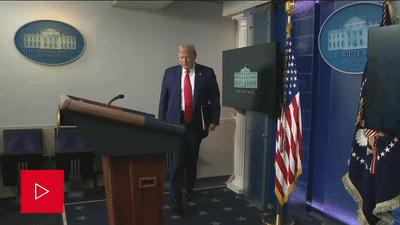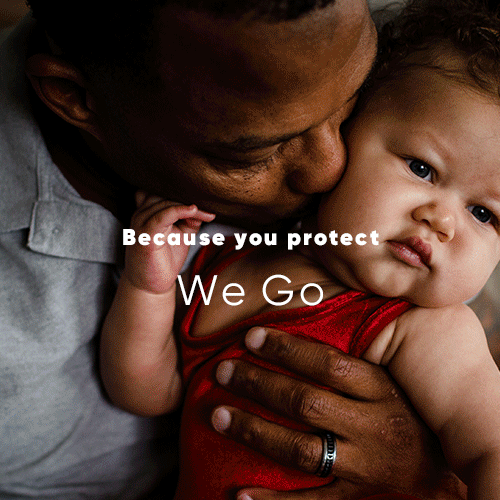
BY BEN WHITE
|
IS THE U.S. ECONOMY TANKING AGAIN? Maybe the United States is sliding down the second slope of a W-shaped economic recovery as coronavirus cases surge. Or perhaps it’s in the flattening section of a reverse square root bounce. Or maybe we’ve hit the slow-rise portion of the Nike swoosh comeback.
Economists toss out all kinds of letters and shapes to discuss recovery from the brutal virus-induced recession. But they really have no clue where we are right now beyond one thing: This is obviously not the V-shaped bounce back predicted by hopeful Trump administration officials. Such a snap back never seemed plausible given the lack of a vaccine and the dice-rolling nature of most re-opening efforts.
While the future is badly befogged, some things are clear. The U.S. job market remains a hot mess with first-time jobless claims rising again to 1.4 million last week and a staggering total of nearly 32 million receiving jobless benefits. That’s about 20 percent of the entire U.S. job market, a completely unsustainable figure.
The stock market has regained much of the ground lost since February but a good bit of that likely reflects excessive optimism and earnings gains fueled by giant job cuts and other cost saving efforts. Bankruptcies are surging and will likely get worse.
Some of us told you months ago that we’d likely wind up in exactly this position given U.S. shortcomings on testing and tracing and the relatively limited scope of federal rescue efforts in comparison with the enormity of the problem. And now we are at risk of making matters even worse with Senate Republicans and the White House in a complete train wreck over how to structure a new aid package even as emergency jobless benefits begin to expire this weekend.
And things could look even worse when July jobs numbers come out early next month, putting more heat on Congress to act and further risking President Donald Trump’s polling advantage on the economy, which now appears mostly wiped out.
“The economy bounced back in May and June but it’s now gone sideways and I would not be surprised to see a net job loss in July,” Mark Zandi, chief economist at Moody’s Analytics, tells The Nightly. “I don’t expect the economy will go anywhere until the pandemic is over and there is a widely adopted vaccine. And if lawmakers wait more than a week or two to act there’s a very good chance we are back in recession.”
The question then would become just how bad a double dip recession could be . That depends in significant part on how bad the virus gets and how long it takes to get a vaccine. If it rages out of control and forces massive new lockdowns — a relatively unlikely scenario given nobody wants to do it — the second dip could at least rival the first, which is expected to show a gross domestic product decline of an annualized 35 percent or so in the second quarter.
The more likely outcome is that limited new lockdowns and nervous consumers mute the expected bounce in the third and fourth quarters as more businesses fail. The unemployment rate could also nudge up once again after falling to 11.1 percent in June from a high of 14.7 percent in April. All of which would mean a slower and more painful recovery — and less bounce for Trump this fall — with limited fiscal room or political will to pour in more federal money to absorb massive and persistent joblessness.
And if people aren’t having their incomes replaced or finding new jobs, that would set the stage for the ripple effects of more credit card, auto and home loan defaults and tighter credit standards, all of which could get dumped in the lap of the next administration if current poll numbers persist.
Welcome to POLITICO Nightly: Coronavirus Special Edition. Renu is on the move, but her inbox is still right here. Reach out rrayasam@politico.com or on Twitter at @renurayasam.
A message from Emergent BioSolutions:
Our global team is going full speed to develop potential therapies that may help treat COVID-19. At the same time, we’re collaborating on innovative vaccine candidates that can be made by the millions. Discover what we’re doing right now.
| FIRST IN NIGHTLY |
CHRISTIE HITS K STREET — Chris Christie dreamed of becoming president. Now, he’s settling for a different role in Washington: lobbyist. The former New Jersey governor is making big money from businesses trying to tap the gusher of coronavirus relief funds coming from the federal government.
Newly filed disclosures show Christie’s firm pulled in $240,000 in less than three months for lobbying the Trump administration on coronavirus aid on behalf of three New Jersey hospital systems and a Tennessee-based chain of addiction treatment centers, Theodoric Meyer and Adam Cancryn report. Christie appears to be leaning on his ties to the Trump administration as he makes his way on K Street. In a pitch to consult for Puerto Rico’s Fiscal Agency and Financial Advisory Authority earlier this year, Christie bragged that he had served as chairman of Trump’s transition effort to staff the federal government — leaving out that he was ousted days after Trump unexpectedly won the 2016 election.
Christie is hardly the first former governor to land on K Street. But it’s unusual for a former presidential candidate who hasn't ruled out running again to become a lobbyist, especially without joining a major Washington firm. And he’s off to a fast start pulling in business: Christie only registered to lobby for the first time last month, in the middle of a lobbying boom fueled by the federal government’s multi-trillion-dollar response to the pandemic.
DON'T MISS - POLITICO'S NEW "FUTURE PULSE" NEWSLETTER: The coronavirus pandemic accelerated long-simmering trends in health care technology and one thing is certain: The health care system that emerges from this crisis will be fundamentally different than the one that entered. From Congress and the White House, to state legislatures and Silicon Valley, Future Pulse spotlights the politics, policies, and technologies driving long-term change on the most personal issue for voters: Our health. SUBSCRIBE NOW.
| COVID-2020 |
RNC LEAVES NORTH FLORIDA — Trump announced today he was canceling Republican National Convention keynote events set to be held in Jacksonville, Fla., next month, as the state continues to grapple with a surge in coronavirus cases, breaking news reporter Caitlin Oprysko writes.
"I told my team it‘s time to cancel the Jacksonville, Fla., component of the GOP Convention," Trump said during a coronavirus briefing at the White House, explaining that “it's just not the right time“ to hold a "big, crowded convention."
The convention‘s official business meetings were always scheduled to remain in Charlotte, N.C., and Trump said today that those would go on as planned.
But the party's big events, including Trump’s prime-time nomination speech, which the party decided to move to Jacksonville only last month, will move online, the president said.
| AROUND THE NATION |
Researchers at Georgia Tech launched an interactive site so that users can visualize and assess the risk that people with Covid-19 will be present at a wedding, party or other event they are planning to attend. Nightly's Myah Ward talked to the lead developer, Joshua Weitz, a professor of biological sciences, about the Covid-19 Event Risk Assessment Planning Tool and what he wants it to accomplish. This conversation has been edited.
How’d you come up with the idea?
In March, as cases began to increase, friends and colleagues began to ask me: What are the odds of going to an event and having someone there, potentially with Covid, who can then pass it on to others?
And so we decided to take this mathematical idea and turn it really into a localized county level map that personalizes and localizes questions, so that people could have an intuition for what ongoing risks were and how those risks changed as the event size changed.
Can you walk me through how you calculate risk?
The percentages you see on the map denote the chance that one or more individuals may have Covid-19 in an event of a particular size. If you go to Fulton County, Ga., and at 100 individuals, the event risk level is going to be quite high, above 90 percent. But as I drop the event size, for example down to 25, and ask that same question, you'll see the entire map scales in color because the risk is lower.
We take the per capita risk, and we use that per capita risk to imagine that many people showing up — drawn at random from the county, so there's an assumption that it's homogeneous — and we use that to do a simple calculation of the chance that just one of those may have Covid-19.
Once you get large gatherings above 100 or 500 or certainly 1,000, you have to have very low percentages at a per capita level to make sure that no one amongst that very large group of people has Covid-19. That does not mean there's going to be a transmission, it just means that there's a risk of exposure.
How could you apply this to school reopenings?
If we have a community spread level of a percent or half a percent right now — a college of size 10,000 could have 100 or so imported cases. Those imported cases could rapidly spread if we don't do entry testing, if we’re not taking the precautions to wear masks, if we're not taking other precautions to reduce direct contact.
A message from Emergent BioSolutions:
| FROM THE HEALTH DESK |
WHICH WAY WILL THE CURVE BEND — A monthlong resurgence in Covid-19 cases appears to be hitting a peak, but a new forecast of the coronavirus’ trajectory is fueling conflicting interpretations about whether the worst is over.
Slowing caseloads in Florida and Arizona have fanned a narrative that the worst of the disease spread is cresting in some of the nation’s worst hot spots — repeating a pattern seen in early June, health care reporter Tucker Doherty writes. But public health experts on Thursday issued new warnings that the virus is still spiraling out of control, only in the form of a rolling series of outbreaks in almost half the states, with more troubling signs in many others.
The U.S. now regularly records more than 60,000 coronavirus infections per day and logged its 4 millionth case on Thursday, according to a tracker from Johns Hopkins University. The latest forecast from health experts portrays a country besieged by an outbreak shifting north and toward the coasts – as one set of hot spots begin to cool, new ones emerge. Instead of finally bending the curve, infections could plateau at unmanageably high rate or spiral further out of control.
ANOTHER TRIAL FAILURE FOR HYDROXYCHLOROQUINE — The coronavirus drug frequently touted by Trump and his trade advisor Peter Navarro failed in another large clinical trial in mild and moderate Covid-19 patients in Brazil, researchers reported today in the New England Journal of Medicine. The results are just the latest in a string of negative trial results, health care reporter Zachary Brennan writes. Navarro has pushed for the FDA to re-issue the emergency authorization the agency retracted in June. Last week, results published in the Annals of Internal Medicine from a placebo-controlled study of almost 500 patients showed that hydroxychloroquine “failed to show a substantial clinical benefit in improving the rate of resolution of Covid-19 symptoms.” Data from a randomized, controlled trial in Spain of 293 patients, published last week in Clinical Infectious Diseases, also showed no benefit.
THE DOCTOR IS DIGITAL — Virtual health care has surged during the coronavirus pandemic. Will it last? In the latest POLITICO Dispatch, health care reporters Mohana Ravindranath and Dan Diamond explain how the virus could change the future of medicine.

Chatsworth House guide Lizzie Ross poses for the media and adjusts a social distancing sign in the Painted Hall as the stately home prepares to reopen to the public in Bakewell, England. | Getty Images
| TALKING TO THE EXPERTS |
Can the economy reopen without the child care system up and running?
“The question is: How much is a lack of child care holding us back, versus how much are people still staying at home because they don’t want to get Covid? Even if child care is not holding us back in September or October, we are letting the whole child care system erode in such a way that it’s not going to be there for us when we are fully ready to go back.
“I see a world where we’re all vaccinated by next spring, and we’re ready to have every kid back in child care, back in school, back at camp — but now they’re starting from scratch, recruiting workers because all their workers have sort of disappeared or moved on. Where I really see the child care crisis holding us back is once we are ready to have all the jobs come back and we’re really ready to recover. Even though we’ll have opened the schools, opened the child care centers, the workers aren’t going to be there, the slots aren’t going to be there. I’m very concerned at how few policymakers seem to understand the potential for long-term damage.” — Betsey Stevenson, a labor economist at the University of Michigan and former member of President Barack Obama’s Council of Economic Advisers, as told to POLITICO Magazine’s Zack Stanton
| ON THE HILL |
IN DISARRAY — With 30 million Americans unemployed and coronavirus cases spiking nationally, White House officials and Senate GOP leaders couldn’t even come to an agreement among themselves on a starting point for a new relief package, let alone begin bipartisan talks with Democrats, Marianne LeVine and John Bresnahan write.
They clashed over a payroll tax cut, more money for testing, unemployment insurance benefits and a raft of other measures to address the unprecedented economic slowdown. The planned unveiling of a new $1 trillion bill got delayed and delayed again. With Election Day only 103 days away, this is the last thing an embattled president and Senate majority needed to happen. Republicans acknowledged the bickering, even as they tried to downplay the episode.
“We have to resolve some of the conflicts with the administration. They moved in our direction.” said Sen. Thom Tillis (R-N.C.), who faces a tough race in November. “It's a normal part of the sausage factory.”
BECOME A CHINA WATCHER : The U.S. is talking about China in a way it hasn't since the days of Mao Zedong's rule. While experts say there is a "zero percent" chance of a decoupling between the two world powers, the era of seamless globalization is over. Join the conversation and gain expert insight from informed and influential voices in government, business, law, tech, and academia. China Watcher is as much of a platform as it is a newsletter. Subscribe today.
| ASK THE AUDIENCE |
Nightly asks you: Have you gotten tested for Covid-19? Do you want to get tested but are unable to? Tell us your testing experience. Send us your story with our form and we’ll include some of the responses in Friday’s Nightly.
| NIGHTLY NUMBER |
23 days
The amount of time until Trump throws out the first pitch at the New York Yankees-Boston Red Sox baseball game in the Bronx on August 15. Trump announced the move at today’s press conference.
|
| PARTING WORDS |

Anthony Fauci, director of the National Institute of Allergy and Infectious Diseases, throws out the ceremonial first pitch prior to the game between the New York Yankees and the Washington Nationals at Nationals Park in Washington. | Getty Images
TAKE ME OUT OF THE BALLGAME — Nightly’s Tyler Weyant writes:
If you live around Nationals Park in Washington long enough, as I have for a number of years, you are able to mark the passage of time by what you see every day: Scalpers settling into their usual spots on Half Street outside of the metro station. Folks who have had one too many beverages being not-so-kindly asked to leave the Bullpen, a set of bars and throngs of people amid stacked shipping containers. And, of course, Nats fans milling about, rooting for the home team.
The scenes following last year’s World Series victory led many to anxiously await the return of baseball and those regular rhythms around the ballpark. No one quite thought it would play out this way: Tonight, weather permitting, the New York Yankees are in D.C. to start a planned 60-game season without a fan in the stands.
We’ve all pondered what the return of sports without fans means to so many facets of both the games and the cities and supporters that watch them. (I have done so in this very space!) And it seems as though D.C. is trying to retain some semblance of normalcy: The Bullpen is still open, albeit with reservations needed, and city guidelines enforced. The racing of giant presidents will still take place in the fourth inning, but via a pre-filmed contest outside the ballpark. And there was still a first pitch, from Anthony Fauci, a newly household name in 2020 who’s made no secret of his baseball allegiances.
But it won’t be the same, because we won’t be there. We won’t crowd onto the Green Line trains and debate Juan Soto’s greatest plays (much less his positive Covid test). We won’t walk along the Anacostia and admire a summer night before heading in to buy an incredibly pricey hot dog. Sure, we’ll watch, but the absence of us creates a void in the game. What is America’s pastime without Americans there to view it?
Covid has taken so much and so many from us, and to be transported out of that by a baseball game for even a moment is reason enough to crack a smile. But for the people of Washington, who poured into the autumn air to celebrate a world championship last year, they don’t need George Will-esque prose to describe the mood upon the sport’s return. Are we glad baseball’s back? Sure. But overall? This sucks. We can’t wait to properly celebrate, hopefully in the not-too-distant future
A message from Emergent BioSolutions:
We go after public health threats. In the fight against COVID-19, we are going full speed to develop potential new therapies and vaccine candidates.
We go for critical innovations. We are developing two potential hyperimmune treatments for severe hospitalized COVID-19 patients and individuals at risk. Based on proven technology, the research and testing are underway.
We go in partnership with others. We are working with industry innovators to bring COVID-19 vaccine candidates to market. We have the capacity to manufacture vaccines in the tens to hundreds of millions, and we are propelling development forward.
We go. And go. From fighting anthrax to helping prevent smallpox and developing vaccine candidates, we go all in. Because public health threats will never stop. And neither will we.
See how we go all in.
We go for critical innovations. We are developing two potential hyperimmune treatments for severe hospitalized COVID-19 patients and individuals at risk. Based on proven technology, the research and testing are underway.
We go in partnership with others. We are working with industry innovators to bring COVID-19 vaccine candidates to market. We have the capacity to manufacture vaccines in the tens to hundreds of millions, and we are propelling development forward.
We go. And go. From fighting anthrax to helping prevent smallpox and developing vaccine candidates, we go all in. Because public health threats will never stop. And neither will we.
See how we go all in.
Did someone forward this email to you? Sign up here.
Follow us on Twitter
Renuka Rayasam @renurayasam
|
FOLLOW US
|






 t the U.S. Holocaust Memorial Museum in Washington, there's a poster which identifies
t the U.S. Holocaust Memorial Museum in Washington, there's a poster which identifies 